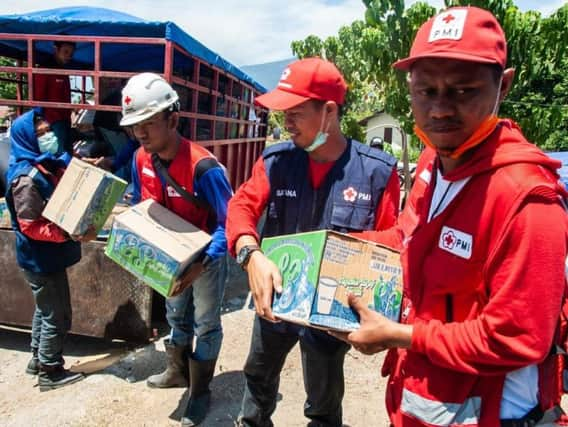What DEC charities are doing to help after Indonesian tsunami


More than £15 million has been raised in Scotland through DEC's Indonesia Tsunami Appeal, with the UK total raised amounting to more than £17 million.
Thirteen DEC members have national affiliates and local partners in Indonesia able to provide relief, recovery and reconstruction assistance based on the scale of need.
Action Against Hunger will work with its local partner to provide pregnant women and breastfeeding mothers, elderly people and children under five with sanitary kits, food and medicines. They will also focus on preventing children under five from becoming undernourished. Priorities also include community kitchens, water, sanitation and hygiene, some Cash for Work.
ActionAid: The Indonesia affiliate of ActionAid is now on the ground deploying with generators and materials to build shelters. ActionAid Indonesia is registered as national entity. Plans are still evolving in Palu and Dongala. The surge team is being deployed as far as Jakarta only. Priorities are shelter, food, water, sanitation and hygiene.
Age International plans to work through local partners to meet the immediate needs of older people, focusing on shelter, health and cash grants. Priorities for older people, including those who are immobile – shelter, hygiene kits (focused on women), water, sanitation and hygiene, referrals to existing services.
British Red Cross affiliate Indonesian Red Cross has been on the ground responding since immediately after the tsunami hit, mobilising over 500 volunteers to support search and rescue efforts, deliver food, water and medical assistance, and reunite separated families. The Red Cross has already distributed16,000 litres of water, sent 22 ambulances and 22 water trucks, and set up three medical clinics. More than 70 tons of further aid is on its way now, which volunteers will carry to isolated communities by foot.
CARE International is prioritising shelter and water, sanitation and health initially, and will consider livelihoods further down the line. A $5m response is planned. They are currently working on the assumption that importing goods will not be possible, but have many prepositioned stocks in other countries if allowable.
CAFOD is present in affected areas through its Caritas partner, which will focus on providing generators, lighting equipment, body bags, food items for babies and children, and setting up public kitchens, alongside the provision of clean water, medicine and temporary shelters. Priorities are water, food, hygiene kits and emergency shelter.
Christian Aid will provide health services, water, sanitation and hygiene, tarpaulins, blankets, food and tents through its local partner.
Islamic Relief staff and local partners are distributing generators, petrol, tarpaulins and blankets, medical equipment and supplies, toiletries and kitchen utensils, food packs and bottled water to people displaced by the crisis. They have also set up a public kitchen for displaced people, providing first aid and hot food. Islamic Relief Indonesia are currently in the process of transporting 37 tonnes of food for families affected by the Tsunami
Plan International Indonesia will deploy staff with specialisms in areas such as child protection, education and gender. There are already staff on the ground supporting with child protection and shelter. Plan also has prepositioned hygiene kits, blankets, tarpaulins and school kits at a warehouse in Jakarta.
Oxfam founded and helps coordinate a hub of 16 local humanitarian partner organisations, including seven now the ground in Sulawesi. that respond across Indonesia. Oxfam has an ambition to reach 500,000 people with relief assistance. It will deploy equipment from its warehouse in Jakarta, then rapidly scale up to provide safe and clean water, toilets and hygiene kits, emergency shelter, food assistance (either in kind or cash).
Save the Children’s local partner have provided more than 500 hygiene and shelter kits to families, with daily distributions planned over the coming weeks. They are establishing three safe child-friendly spaces in Palu city where children can play and recover while their families receive information on how to access services to rebuild their lives. They have also set up a registration tent where parents and children who have been separated can lodge missing person reports, and from where children can be taken to a safe shelter while the agency searches for their family.
Tearfund’s partner has deployed medical assistance and will focus on the provision of drinking water, medicine, food, tarpaulins and blankets. They will set up a soup kitchen and provide food for infants and children. Tearfund does not have staff in Indonesia, but will consider deployment once it understands needs on the ground from its local partners.
World Vision staff have already begun meeting the needs of children and families who have lost everything. Prepositioned supplies are in place and additional shelter kits, tarpaulins, blankets and mats have been dispatched. Emergency infant feeding has already been provided to a number of mothers in the most affected areas. World Vision is prioritising shelter, health, protection, bedding, toiletries, kitchen utensils, and other household items.
About the DEC
At times of very great need, the Disasters Emergency Committee (DEC) brings together a unique alliance of the UK’s leading aid charities and broadcasters to maximise fundraising and quickly deliver effective emergency relief. The DEC brings together 14 major UK aid charities: Action Against Hunger, ActionAid UK, Age International, British Red Cross, CAFOD, CARE International UK, Christian Aid, Concern Worldwide UK, Islamic Relief Worldwide, Oxfam GB, Plan International UK, Save the Children UK, Tearfund and World Vision UK.